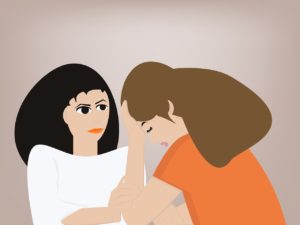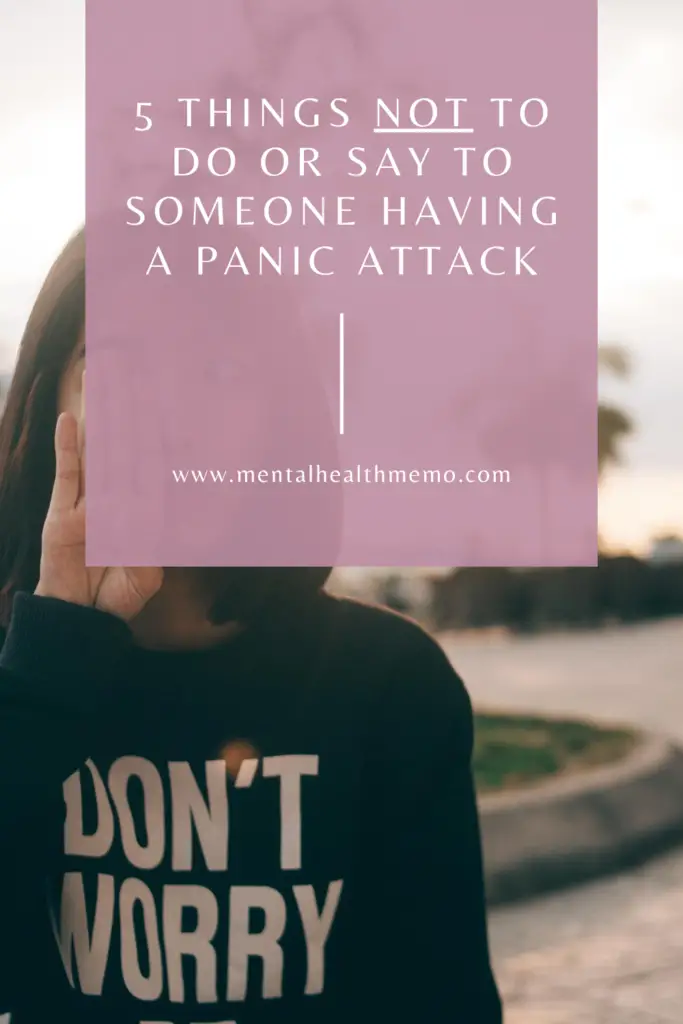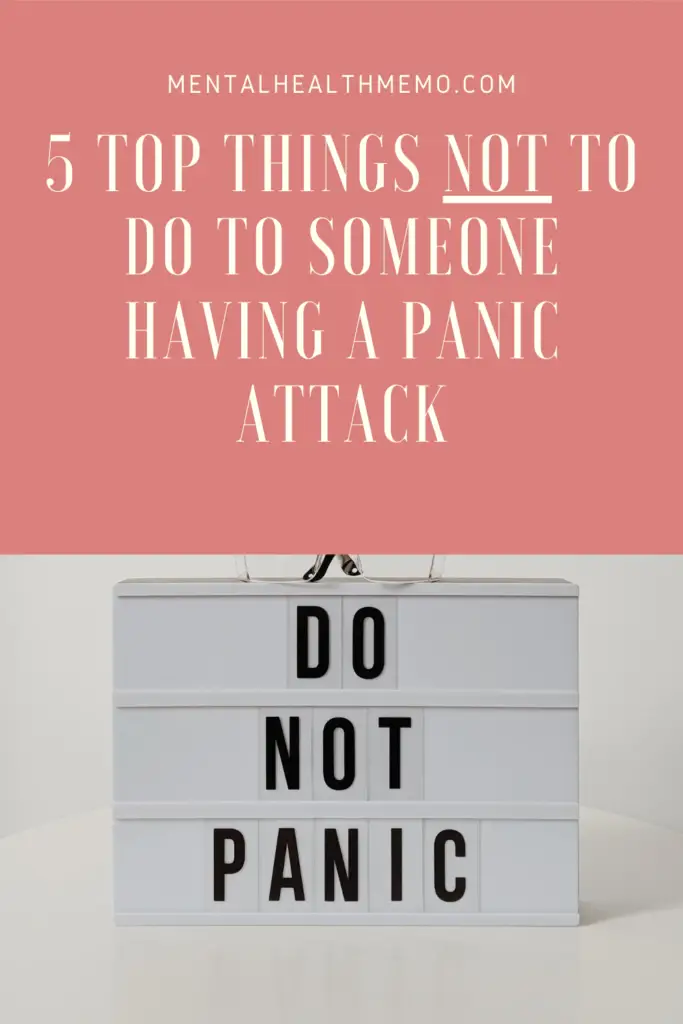Table of Contents
Why is it Important to Know Things Not to Do to Someone Having a Panic attack?
Up to a third of adults will experience a panic attack in any given year and anxiety disorders are the most common mental illness in the U.S, alongside depression.
As someone with Panic Disorder, I have had the opportunity (that almost makes it sound nice) to experience having panic attacks around many different people, with varying outcomes. I found that most people didn’t know what to do or say, resulting in them doing things that made me feel 1000000% worse.
If we can go out and get First Aid training, why can’t we take some time to learn about how to deal with mental health emergencies? Cause frankly, if you’ve ever seen someone having a full-blown panic attack, you’d know it’s pretty terrifying.
So here are a few guidelines to help you figure out the top 5 things not to do to someone having a panic attack. Please note that panic attacks and anxiety attacks are subjective and this information may not apply to everyone. However, these are common complaints I and many others have expressed.
If you’re trying to learn how to properly support someone having a panic attack and want to know what you SHOULD do, I’ve got you covered! Here is my guide for what to do/say to someone having a panic attack!

What is a Panic attack?
Before we can dive into what you shouldn’t be saying or doing to people experiencing panic attacks, it’s important to first understand what a panic attack actually is.
A panic attack is essentially your body’s flight, fight, or freeze instinct going off because it believes you are in danger. Symptoms of a panic attack can include but are not limited to:
- racing heart
- labored breathing
- shaking
- numbness in the body
- frequent need to use the washroom
- an impending feeling of doom
- various body aches
It’s not a pleasant experience AT ALL. However, this is an essential response we as humans have, and it’s the reason we have been able to survive for so long. It helps us to make quick life-saving decisions as it pumps adrenaline through us.
It’s also important to note that a panic attack and an anxiety attack are NOT the same thing.
So these tips may or may not be effective or ideal in also helping someone experiencing an anxiety attack.
Things Not to Do or Say to Someone Having a Panic Attack:

Don’t Say There’s Nothing to Be Panicking About
This has got to be the most annoying one I get. The first thing I want to mention is that no situation unless actually life-threatening should trigger a panic attack.
As mentioned before, panic attacks are actually our body having the fight, flight, or freeze reaction, which is absolutely necessary for survival. So the “disorder” aspect of it comes in when you’re experiencing panic attacks for situations that are not life-threatening and should not elicit that fear response in your body.
With that information, I would like to start by saying I am well aware that there is nothing to “worry about”. But it’s not up to me!
While sometimes panic attacks CAN be triggered due to anxiety-inducing situations (even though they shouldn’t), they can also be completely random. Hell, I’ve even had panic attacks while I was SLEEPING (also known as a nocturnal panic attacks).
My point here is that whether triggered or not, the panic attack is still going to take its course and no amount of “don’t worry” will help. Most of the time people know there’s no reason for them to actually be having a panic attack.
So by reminding me that my body is having a messed up reaction to something it shouldn’t, you’re just making me feel even worse.
I know this is especially confusing for people who don’t really experience anxiety (can’t relate), because they just don’t get it. For those folks, please keep in mind we aren’t CHOOSING to have a panic attack!
It’s out of our hands for the most part. It’s also not just in our heads as we’re usually experiencing severe physical symptoms as well.
So stop telling me to calm down. I’m panicking despite all rationale so you’re just gonna have to work with it. Next!
Giving Personal Space
Do you hug your friend that’s having a panic attack? Do you stay away? The question of personal space with panic attacks is very subjective. For me, it actually depends on the type of panic attack I’m having.
Sometimes I find comfort in being held, sometimes I don’t want anyone to touch me, look at me, or breathe at me. That’s why with this point I advise you ask, and then most importantly you LISTEN.
A simple “is it okay if I touch you” is a good enough starting point. Once you get your answer, actually act out on it. I’ve had people still try and touch me when I’ve said not to. WHY WON’T YOU LISTEN?!
If someone is unable to communicate with you, I’d say to avoid touch due to a lack of consent. Forcing something onto someone is DEFINITELY at the top of things not to do to someone having a panic attack.
Thinking You Know Better Than the Person Having a Panic Attack
I touched on this lightly in the previous point but people know what works best for them. Don’t try forcing your ways of calming down onto them.
For example, my biggest trigger is breathing. If my breathing is off, or I’m paying a lot of attention to it, there is an 8/10 chance I’ll have a panic attack. Therefore, breathing exercises make me worse.
Yet regardless I’ve had people continue to try and get me to do them even after I’ve said no, cause they think it’ll work.
Similarly, don’t force people to go outside for air if they can’t move off the floor, don’t make them chug down water when they’re hyperventilating, just ASK AND LISTEN.
The only time I would say forcing someone to do something is okay is if you’re close with this person and they have told you beforehand to proceed with certain actions like getting air, drinking water, or taking medication even if they can’t give consent at the moment.
Aside from that, I’d only recommend offering suggestions and letting the person decide if they want to do them or not.

Don’t Talk Too Much or Ask Too Many Questions
When you’re having a panic attack, it often feels like you’re about to die. All while simultaneously being filled with an intense feeling of doom and fear. This makes it really hard to focus on what someone is saying to you. More or less respond.
For me, no matter how small or big a panic attack is if I get asked a lot of things I get significantly worse. I can barely breathe, how do you expect me to answer all your questions!?
If your person is having a hard time responding to complicated questions, only ask simple yes or no questions so they can shake or nod their head.
“Do you want water?”
“Do you want to get fresh air?”
“Would you like to leave this room?”
“Do you want a hug?”
Questions like these are going to be much more successful.
Don’t Start Freaking out
Seeing someone having a panic attack can be really scary. I really do get it. But if you’re freaking out on the person having the panic attack, now we’ve got 2 people panicking!
I honestly have not experienced anything worse than having a panic attack and the person with me freaking out. Because now I’m even more panicky since you’re also distressed, I’m going to feel guilty about it, AND I’m going to try to hide my symptoms.
All of this will make me worse, subsequently making you worse. It’s a cycle!
Remember that nobody has ever died from a panic attack and that it can really only last around 20-30 minutes (not including the anxiety before and after).
So yes, the experience is intense but they cannot die and the calmer you are the more likely they will be to recover faster. A relaxed demeanor, tone, and simple questions are your key to success.

Conclusion
As I said, this is not all of it and it certainly isn’t accurate for everyone. But it can certainly be some rules to keep in mind if you’re ever in that situation. As always, I love hearing what you have to say. Tell me if I missed anything, or if you agree/disagree with what I wrote.
All my love,
T

